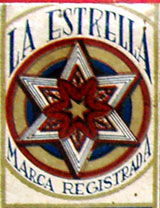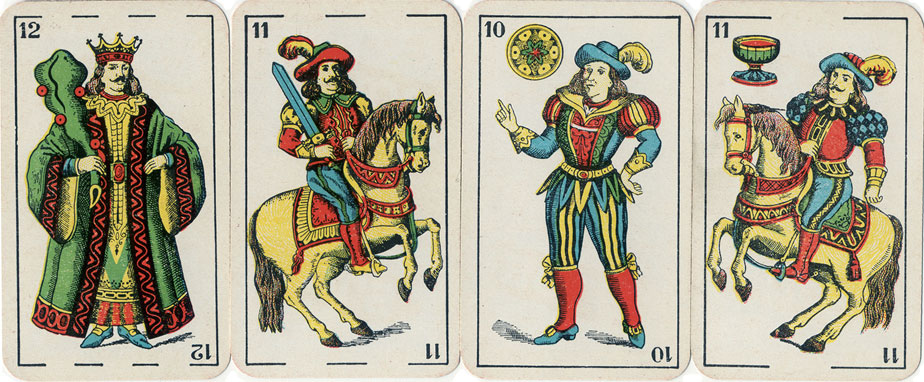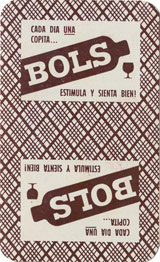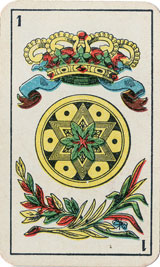Naipes La Estrella
Naipes La Estrella Spanish-suited playing cards manufactured by Vigor S.R.L., Buenos Aires, c.1955.
Naipes LA ESTRELLA Spanish-suited playing cards manufactured by Vigor S.R.L., Buenos Aires, c.1955

Naipes La Estrella was one of Vigor's leading brand of Spanish-suited playing cards, alongside Naipes Barcelonesa, Chinita and La Española. The logo on the four of cups and wrapper shows a six-pointed star above the legend 'La Estrella'. This six-pointed star motif and the name ‘La Estrella’ was originally registered by G. Berger for a Hungarian 'Seasons' deck. The motif now features on the centre of the ace of coins.
The Patent Office Registration documents, dated 22nd June 1955, show the original designs with the new company name overwritten. By holding these up to the light, we can read beneath the name of Igor Domicelj (c.1950-55), who was the company's predecessor. The same applies to the Registration documents for "Naipes Bols", which was the company's first advertising deck produced in 1955, and "Naipes Golfo", a 48-card pack for the game Golfo; both formerly had been produced by Igor Domicelj.

Above: ‘La Estrella’ name and six-pointed star motif from playing-cards produced by G. Berger c.1940

The card designs are based on those of Segundo de Olea (Spain) which had been imported into Argentina since the 19th century. The same designs are used in cards published today by Gráfica 2001 / Naipes La Española, including the six-pointed motof originally employed by G. Berger.

By Simon Wintle
Member since February 01, 1996
I am the founder of The World of Playing Cards (est. 1996), a website dedicated to the history, artistry and cultural significance of playing cards and tarot. Over the years I have researched various areas of the subject, acquired and traded collections and contributed as a committee member of the IPCS and graphics editor of The Playing-Card journal. Having lived in Chile, England, Wales, and now Spain, these experiences have shaped my work and passion for playing cards. Amongst my achievements is producing a limited-edition replica of a 17th-century English pack using woodblocks and stencils—a labour of love. Today, the World of Playing Cards is a global collaborative project, with my son Adam serving as the technical driving force behind its development. His innovative efforts have helped shape the site into the thriving hub it is today. You are warmly invited to become a contributor and share your enthusiasm.
Related Articles

Jockey Club de Buenos Aires
Spanish-suited pack by Chas Goodall & Son Ltd for the Jockey Club, Buenos Aires.

Wrappers
Playing cards were traditionally sold inside paper wrappers, which were usually thrown away.

Egyptian Tarot
Egyptian Tarot inspired by ancient Egyptian art, mythology, and iconography, published by Naipes La ...

Naipes Criollos
“Naipes Criollos” Gaucho playing cards, 1995.

Naipes Cardón
Naipes Cardón designed by Mario Luis Rivero depicting traditional Argentine culture and identity, 20...

El Oráculo de la Bruja
“El Oráculo de la Bruja” fortune-telling cards, 2003.

Martín Fierro
Naipes “Martín Fierro” based on the epic poem by José Hernandez.

Naipes Parliament por Caloi
Carlos Loiseau, better known as ‘Caloi’, was a cartoonist whose designs for Parliament Cigarettes we...

Minifusor Tipo Español
Naipes "Minifusor" tipo Español published by Difusora S.A., c.1980.

Clark’s Industries
Clark’s Industries Spanish Cards, c.1975.

El Tripero
Hand-drawn semi-erotic, satirical playing cards by Lautaro Fiszman ‘El Tripero’, 2002.

Mordillo Skat
Mordillo Skat designed by Guillermo Mordillo, c.1979

Cartas Gitanas
The designs of these fortune-telling cards are largely taken from nineteenth century Austrian "Rural...

Naipes Garaycochea
Humorous playing cards designed by Carlos Garaycochea, Buenos Aires, c.2002.

Desafio Football Caricatures
“Desafio” playing cards with football player caricatures, c.2000

Roche Playing Cards
Roche Pharmaceutical playing cards, 1980s.
Most Popular
Our top articles from the past 28 days



